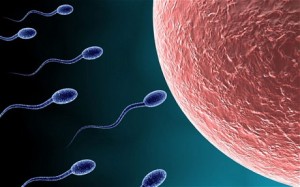
There are always new articles popping up about what a woman can do to enhance her fertility potential. These enhancements run from the medical – eating healthy, exercising, having an ideal BMI – to the more superstitious – eating exotic fruits and nuts or standing on your head after sex. What’s often left out of this conversation though is what the male partner should be doing to prepare for conception. While the man will not be carrying the baby, his sperm will help to create that baby – and if his sperm are not healthy, male infertility may arise.
The Fox News article titled “Preventing male infertility: 12 natural ways to make healthy sperm” covers a variety of tips to help men have the most optimal fertility potential, recommending everything from eating pomegranate to wearing loose-fitting underwear. Since men produce new sperm every day, lifestyle changes have been shown to increase sperm quality. Here are some suggestions from the physicians at Shady Grove Fertility:
Reversing Male Infertility: Make Physical Fitness and Healthy Eating a Priority
As with women who have fertility complications from being under or overweight, men suffer from similar complications. Abnormal semen parameters (i.e. low sperm counts and low sperm motility) have been seen to increase with obesity. Overweight men have been found to have decreased levels of testosterone and elevated levels of estrogen, an issue that may impair signals from the brain that regulate sperm development. Overweight men are also at risk for impaired spermatogenesis, the process by which sperm are formed, due to increased scrotal temperatures. By maintaining a healthy diet and staying active, these potential risks can be alleviated.
It’s Time to Kick that Smoking Habit for Good

Smoking cigarettes can cause a decrease in the three main factors that determine a man’s sperm quality: sperm count, morphology, and motility. Studies have shown that damage is not necessarily permanent and may vary by the quantity and length of smoking history. A man’s fertility rate can completely return to normal within a year of quitting smoking.
Other drugs, including marijuana, have shown to decrease sperm counts, according to Dr. Ricardo Yazigi. “About 33 percent of chronic users will have low sperm counts… [men] should avoid use when trying to get pregnant.” Read more about the impact of drug use on male fertility.
Ease Back on Alcohol Consumption
Excessive consumption of alcohol in men has been seen to have an impact on fertility in several studies. Men who consume large quantities of alcoholic drinks (five or more) may have lowered testosterone levels and reduced sperm quality and quantity. Alcohol is also linked to impotence in men. It has been shown, though, that reducing the amount of alcohol consumed can quickly reverse these side effects.
Too Much Heat Can be Dangerous
Sperm counts and sperm quality may be affected by frequent or long visits to saunas, steam rooms, and hot tubs. This exposure to the heat does not have a permanent impact on sperm though, and sperm should return to normal quality and quantity within a few months of discontinuing sauna stays. Additionally, men should be wary of common household ‘heats’ like resting their laptops over their pelvic region – an issue that can easily be resolved by using a laptop lap board or cooling pad.
Male Infertility Improved with Lifestyle Changes and Sperm Regeneration
While there are many unknown factors that can cause male infertility, the aforementioned lifestyle tips have been shown to make a remarkable difference in men whose habits are affecting their fertility. It is beneficial for any man who is trying to conceive with his partner to keep a healthy lifestyle: minimizing alcohol intake, quitting smoking, and eating healthy and exercising.
The fact that men produce millions of new sperm every day makes it highly beneficial to men who want to alter their lifestyle habits. Sperm take about 74 days to mature, which means that men who do make lifestyle changes only need to wait about three months before seeing improvements in sperm quality and increasing your chance for reproductive success.
If you have questions regarding factors that may affect male fertility or would like to schedule a new patient appointment, please call our New Patient Center at 877-971-7755 or click to schedule an appointment.

